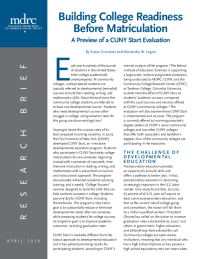Building College Readiness Before Matriculation
A Preview of a CUNY Start Evaluation

Each year hundreds of thousands of students in the United States enter college academically underprepared. At community colleges, underprepared students are typically referred to developmental (remedial) courses to build their reading, writing, and mathematics skills. About three of every five community college students are referred to at least one developmental course. Students who need developmental courses often struggle in college, and graduation rates for this group are disconcertingly low.
Hoping to boost the success rates of its least prepared incoming students, in 2009 the City University of New York (CUNY) developed CUNY Start, an innovative developmental education program. Students who participate in CUNY Start delay college matriculation for one semester, beginning instead with a semester of noncredit, time-intensive instruction in reading, writing, and mathematics with a prescribed curriculum and instructional approach. The program also provides enhanced academic advising, tutoring, and a weekly “College Success” seminar designed to build the skills that can help students succeed in college. Students pay only $75 for CUNY Start, including the textbooks. The program’s short-term goal is to substantially reduce or eliminate developmental needs after one semester, while preparing students for college courses. Its long-term goal is to improve academic outcomes, including graduation rates.
CUNY Start is markedly different from the typical approach to developmental education and it has yielded promising results for participating students, according to CUNY’s internal analysis of the program. The federal Institute of Education Sciences is supporting a large-scale, random assignment evaluation, being conducted by MDRC, CUNY, and the Community College Research Center (CCRC) at Teachers College, Columbia University, to determine the effect of CUNY Start on students’ academic success, compared with the usual courses and services offered at CUNY’s community colleges. The evaluation will also examine how CUNY Start is implemented and its costs. The program is currently offered to incoming associate’s degree seekers at CUNY’s seven community colleges and two other CUNY colleges that offer both associate’s and bachelor’s degrees; four of the community colleges are participating in the evaluation.
This brief provides a first look at an evaluation of CUNY Start, describing the program model, the students in the study sample, and the outcomes being tracked. The findings from the evaluation will be important for CUNY but also for other colleges, policymakers, and anyone who is interested in strategies for boosting the success of college students who have very low basic skills. Despite myriad attempts at developmental education reform, little has been rigorously evaluated and found to be particularly effective for students with substantial developmental needs. If CUNY Start is making a meaningful difference in boosting the success rates of students with very low basic skills, it will be a model for others to consider.
Coauthor Alexandra W. Logue is a Research Professor in the Center for Advanced Study in Education at CUNY.






